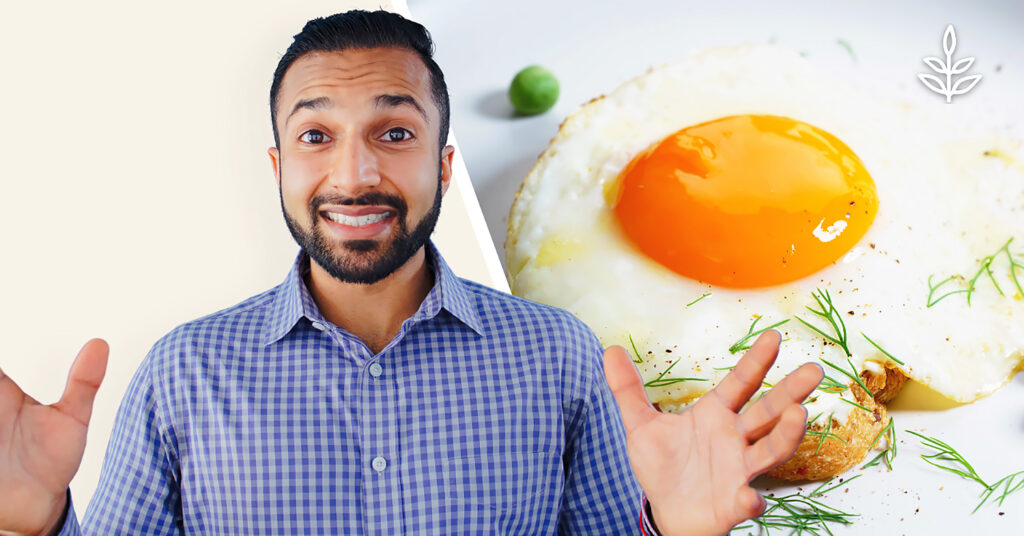Wondering whether or not you should nix eggs from your diet?
On this episode of LIVEKINDLY With Me, Dr. Matthew Nagra—a naturopathic doctor based in Vancouver—debunks egg nutrition. “Now, I know what you’re going to say: ‘Eggs have a ton of nutrition,’” Dr. Nagra says. “While it is true that eggs do offer some nutrition, there are certainly much healthier and nutritious options that are also better for the environment and the animals.”
“Please be advised that this is just for educational purposes,” he adds. “It does not replace medical advice. And if you are planning to change your diet, please consult with a health care provider first.”
So, What About Eggs?
In the wild, chickens lay about 10 to 40 eggs per year. However, factory-farmed chickens have been selectively bred over time to lay between 250 and 300 each year. That’s nearly a jump from about once a month to once a day.
“This is incredibly taxing on their bodies and can lead to a host of health problems, including osteoporosis,” Dr. Nagra explains.
Eggs feature two nutritional components: the egg white and the egg yolk. The former contains about four grams of protein. “But they contain very little in the way of minerals or vitamins,” he says. The egg yolks contain much of the nutritional value. They contain B vitamins, choline, selenium, and a small amount of vitamin D. But they also contain a large amount of cholesterol.
“Dietary cholesterol has been shown time and time again to raise our LDL or bad cholesterol levels,” Dr. Nagra continues. A 2019 study found that each additional half egg per day increased the risk of cardiovascular disease by six percent. A more recent study, released this year, found that each additional half egg per day increased the risk of dying from cardiovascular disease or cancer by seven percent each.
How Do Eggs Stack Up to Other Foods?
Dr. Nagra explains: “The most important question you can ask in all of nutrition research is, ‘compared to what?’” Recently, there have been several substitution analyses conducted on large populations to determine the risk of swapping out various foods, eggs included.
A 2021 study, assessed the dietary and lifestyle habits of 29,682 people over the course of 19 years. The foods researchers looked at were eggs, processed meat, unprocessed red meat, poultry, fish, nuts, legumes, and whole grains.
The study found that replacing eggs with just about any other food other than processed meat led to reductions in cardiovascular disease and/or all-cause mortality. “Now, that was just for one egg a week,” Dr. Nagra explains. “If you were to replace one egg per day with one of these other foods, it led to even more substantial reductions.”
Nuts led to the greatest benefits with a 22 percent reduction in all-cause mortality. “Plants, as a whole, performed excellent—especially for cardiovascular disease,” he adds.
What About Plant-Based Eggs?
If you’re looking to go egg-free, there are many plant-based options readily available.
For absolute replacements, there is JUST Egg, which is made from mung beans. Follow Your Heart also offers a vegan egg. You can also opt for more whole food options like tofu, which works well as a scramble, or chickpea flour, which can be used to whip up a tasty omelet. And you can use seasoning and nutritional yeast to give them a color and flavor similar to their hen-derived counterparts.
For egg alternatives to use in baking, apple sauce, ripe mashed bananas, aquafaba (the liquid from canned chickpeas), and ground flax in water. For a complete guide to vegan eggs, click here.
“To demonstrate how you can make absolutely make a really nutritious plant-based egg meal, I’m going to highlight the nutrition from a LIVEKINDLY recipe by Nikki for a chickpea omelet,” Dr. Nagra says.
Just one serving, which is half the recipe, contains 100 percent of a person’s daily needs for vitamins B1, B2, B3, and B6. “You get over half of your daily iron needs, over a quarter of your daily folate, vitamins A, E, C, potassium, and selenium needs,” he continues. “You would get 14 grams of fiber […] 18 grams of protein, about 4 grams of saturated fat, and of course 0 cholesterol.”
LIVEKINDLY is here to help you navigate the growing marketplace of sustainable products that promote a kinder planet. All of our selections are curated by the editorial team. If you buy something we link to on our site, LIVEKINDLY may earn a commission.


